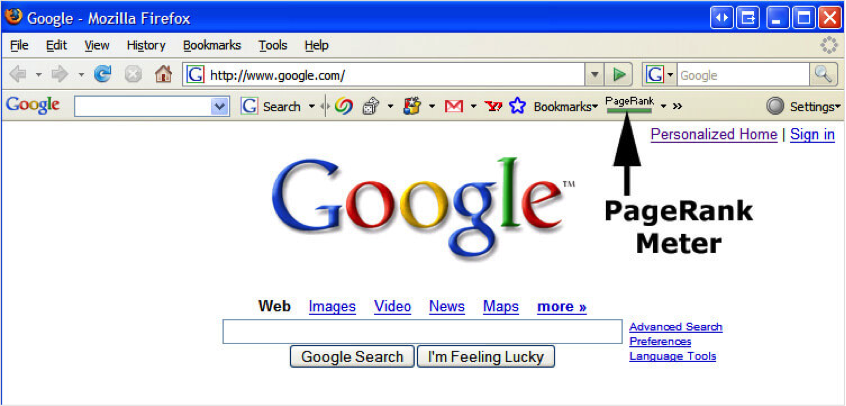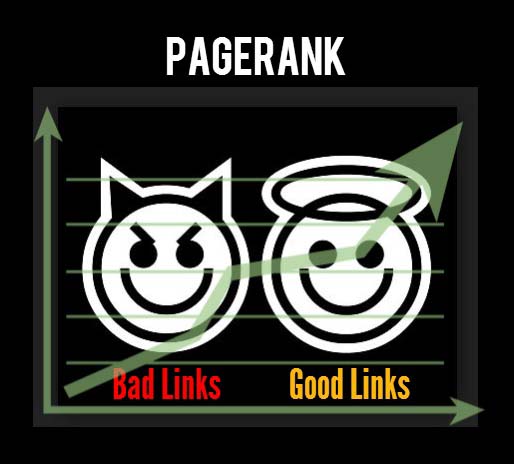
How’d you like to know exactly What PageRank is, How to Increase Page Rank, and get much more Organic Google Traffic?
If you’re not an experienced webmaster, don’t worry, you’re in the right place! Because this is a super simple, practical guide for beginners like me on SEO Page Rank :).
In this post, I’ll explain what PageRank is, why it’s so important to work on this aspect of optimization for search engines, and what strategies you can implement to improve Google ranking.
In PART 1 of “SEO for Beginners”, we focused on topics related to “ON page optimization“, i.e. everything you can do ON and FROM your site, so that when Google evaluates your site, they rank it in a good position.
In PART 2, we’re going to focus on working on the other part of SEO: OFF page optimization, especially with regard to PageRank, as we’ve indicated in the title.
1- What is SEO off page optimization? What role does PageRank play in all this?
SEO off page optimization involves working on those external factors that directly impact: the reputation, authority, and relevancy of your site and content. These are the external factors that matter most to Google when it comes time to assign a score and position your site on their search engine.
1.1- What is Google Page Rank and what role does it play in SEO OFF page optimization?
Page Ranking (PR) is the #1 SEO factor (of over 200 others) that Google uses to determine the ranking of sites on its search engine, so, you have to work on it to improve Google ranking.
It is a numerical figure that works on a scale of 1 to 10, with 10 being the ideal score.
It’s used to express the importance, relevance, reliability, and reputation of your site. These aspects are then consolidated, taking into account the number and quality of links pointing back to your site.
In addition to the volume of links, the PageRank algorithm also considers the origin, the quality, and the reputation of each of the sources that have mentioned you. There are dozens of other factors that influence the PR that we’ll be taking a look at later on in this post-
1.2- Why is Page Ranking important?
Basically, the idea is as follows:
The better the PageRank, the more likely you are to appear at the top of search engine results, which means more visibility and more chances that people click on and enter your site. This means you get more organic traffic. The more people on your site, the more money you make.
Recall that in addition to organic traffic, there are other types of traffic:
- Pay Per Click (PPC) traffic through advertising (costs money).
- Referred traffic: when people enter your site through links that have been referred on other sites.
- Direct Traffic: when the user types the URL of your site directly into the address bar.
2- What is the key factor to improve Google rankings? How to increase Page Rank?
The objective of optimizing and improving PageRank is to get as many quality external links that point to your website organically, i.e. not paid for, false, nor spam.
Keep reading, because later on, I’ll show you various tactics for getting backlinks (external links) and improving PageRank.
So, why is important to have lots of external links or backlinks for your SEO Page Rank?
Google thinks that if your site has been linked to several times, it’s because you’re doing something good. For them, it’s a sign that people like what you do, your content is useful, high-quality, relevant, and therefore you must have a certain authority or be a quality reference in the area that you specialize in, and that’s why people are citing your site or content.
Precisely because of this, it makes sense that aspects such as reputation, authority, and relevance are so important in the concept of PageRank and to improve Google rankings.
To avoid getting frustrated or angry with Google, it’s vital to clarify the following: Reputation is not the same of popularity. You can have a very popular site, but with very low PageRank. How?
Well, pay close attention to the following example that Matt Cutts gives (the head of webspam at Google), to show the difference between popularity and authority/reputation:
“PageRank is not a measure of popularity of the sites. If you were to look at sites that were popular, well, for example porn sites are very popular. But people tend not to link to porn sites. On the other hand, if you take something like the Wisconsin Real Estate Board, probably not a ton of people go there, but quite a few people do link to government websites.
And so popularity in some sense is a measure of where people go, whereas PageRank is much more a measure of reputation, it’s much more a reputation of where people link. And there is a disparity there. Or else, you know, porn sites would have the highest PageRank, and goverment sites would be very very low in our ranking system.”
3- How to increase Page Rank?: Factors to improve on Google ranking.
Every two years, Moz, an authority in the field of SEO, conducts a study through which, they try to understand the Google algorithm better. They try to determine the factors and characteristics of the pages with the best positions in search engine results.
In the table below, you can see, in order of importance, what the key factors are:
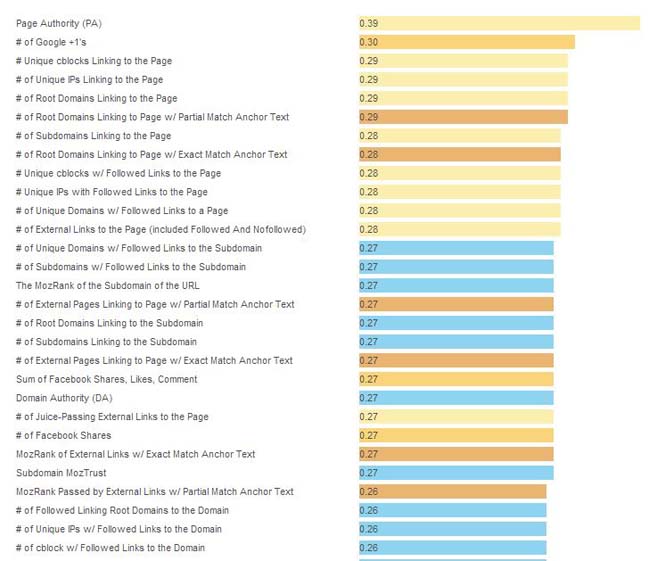
To compare and contrast the results of Moz, here’s another study by Searchmetrics, who came to almost the same conclusions:
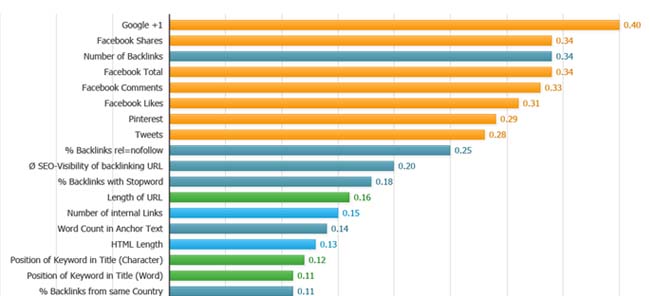
As you can see, the +1 on Google Plus and everything related to links are in the top positions.
To clearly understand this info, we should focus on the following FOUR insights:
- The number and quality of backlinks (external links pointing back to your site) remain extremely important for the Google ranking.
- Social signals continue to become stronger as a factor to improve Google ranking
- Quality and relevant content (context) remains a key factor, and important in building authority, reputation, and relevance.
- The importance of the keyword in the URL or domain has lost relevance.
These studies confirm what Matt Cutts said when he explained why building links and obtaining backlinks, remain the key to achieving greater visibility and organic traffic:
“Links are still the best way that we’ve found to discover (how relevant or important somebody is) and maybe, over time, social or authorship or other types of markup will give us a lot more information about that.”
By the way, out of these 4 insights, social media tends to be the most powerful and where you can work to improve on Google ranking. Why? A good presence on social networks contributes to the positioning of your brand and works as an excellent distributor of content through likes, shares, tweets, retweets, +1s.
On top of that, it serves as a way to reach influencers and other bloggers. If they find what you do relevant, they’ll definitely want to share the quality information you’ve provided among their audience, and end up giving you quality backlinks.
So, on top of working on creating amazing things for your brand, first, you should work on promoting a powerful campaign to distribute your content. You can use tools like Postcron that help increase your presence on Google+, Facebook, Instagram, Twitter, Pinterest and LinkedIn. That way, you can make sure your content reaches as far as possible.
4- The importance of your reputation and Link Juice for the Pagerank.
As we were saying, each site should work to consolidate and achieve a high reputation, as this will directly impact PageRank. That means this is something that must be cultivated and maintained.
When another page in your field, who has an excellent reputation, relevance, and authority, puts a link pointing back to your website, they transfer part of their reputation to your site. However, this means they’ll have less “reputation juice” available for transferring their own links.
Check out how Link Juice, with a good reputation, is normally transferred to other sites:
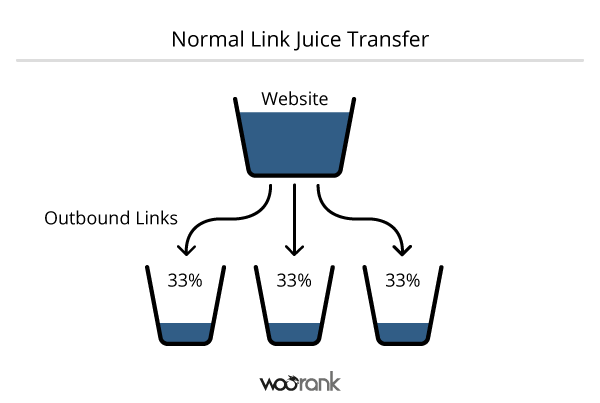
So, whether you have a page with high or low Page Rank, you should hold on to what you’ve already got and manage your “juice reputation” carefully, to save enough for YOUR own links.
You must continue to work hard on the quality of your content and site, so you have more chances of other important websites to consider you useful and relevant and then name you on their sites. That’s how you can get more points or stronger juice, that will definitely influence YOUR PageRank.
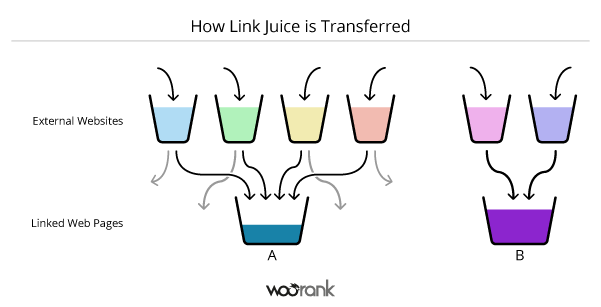
-Image credit: Woorank
If you want to find out and control your PageRank, you can take a peek at these sites:
http://www.prtracking.com/
http://www.advancedwebranking.com/
5- Increase Website Ranking: Domain Authority, the other side of PageRank
Domain Authority is the algorithm developed by Moz, which as we mentioned before, is one of the most authoritative sites worldwide in the field of SEO. It predicts how a website will perform in search engine ranking in Google, based on their reputation.
The Domain Authority uses over 40 factors to determine the score, but the main two are:
- the quantity-quality of backlinks that you get from other sites, and
- how much authority they themselves have.
The DA is the ideal indicator for comparing one site with another or controlling the strength of your website over time. The DA uses a logarithmic scale of 100 points, ideally reaching 100. You can access and measure the DA of your site here:
Open Site Explorer
Moz Toolbar
By the way, if you manage to score a high DA, you’ll be very close to getting a high position on Google’s PageRank.
6- Tactics to improve Google website Page Rank (PR) and Domain Authority (DA)
Since the two of them are quite similar, we propose a “unified solution” to improve both the PR, as much as the DA. The following list gives you practical advice that you can do yourself, even if you don’t have a webmaster.
1- Clean up bad links:
Although this is a task that’s usually done by webmasters, you can consider doing it yourself. Start by using Google to track other pages that mention you. If they have a low or bad reputation, then you can ask them to remove your link from their sites.
2- Get good backlinks:
How to get good backlinks?
- Produce high quality, relevant content, so that people find your site and content linkable.
- Share your content on social networks, as they are another avenue for redistribution of your links, and also through this tactic you can earn likes, retweets, and +1s, which function as social signals that add points to your reputation and in turn, up your PageRank.
- Participate actively in forums and communities to share information of quality and relevance. This is a great way to distribute your links and to get your content or site to reach others.
- Create, develop and enhance your relationships with influencers, bloggers, consultants, and editors. In every industry, you should already know that there are a number of reputable figures that people listen to and trust. Take advantage to develop relationships with them, because they’ll be able to enhance distribution of your content, and include quality backlinks to your blog.
- Submit a profile on Wikipedia and other directories, so that people can find you through different channels which also possess high reputation.
- Guest Blogging: although this practice has been discredited due to the generation of poor quality articles, which have become spam (since they were used only to promote links), Google has failed to encourage this tactic. But, if you can ensure that you can create a high-quality guest post, that’s relevant to the context of your area, then go ahead.
- Promote images and videos through infographics, photos, presentations, webinars, came videos. YouTube adds a lot of weight and reputation.
- Make quality contributions through comments on other articles or sites where you can mention your link.
7- How do you verify your website’s ranking on Google?
In the year 2000, Google launched the first version of PageRank on Internet’s Explorer menu bar. Today, this number ranking created by Google to indicate the importance of web pages in search results is no longer available to the public.
The easiest way to find out your website ranking on Google is to conduct direct searches for your website and significant keywords for your business in Google’s search engine. However, it turns out that this strategy is no longer effective.
The results displayed by Google are not always the same. The ranking depends on where the search is conducted. Additionally, the results adjust to your search history, which is guided by these patterns.
Fortunately, a series of free tools exist to check the ranking of your website on Google. Here is a small list:
- Rankerizer: is an application you can use to monitor the ranking of your website for each keyword chosen to position yourself. You can track the URL in each ranking and if the position has changed compare it to the previous search.
- Free Monitor for Google: This is very similar to Rankerizer because it also shows each keyword ranking. It also adds the first 50 results of a search enabling you to find out what the competition is doing.
- Pro Rank Tracker: this is a paid online tool, Its free version is fairly comprehensive showing you the website ranking on different search engines (not just Google).
- Serplab: Is a free online tool. Here you can find out your overall ranking in seconds. You must register in order to access more details.
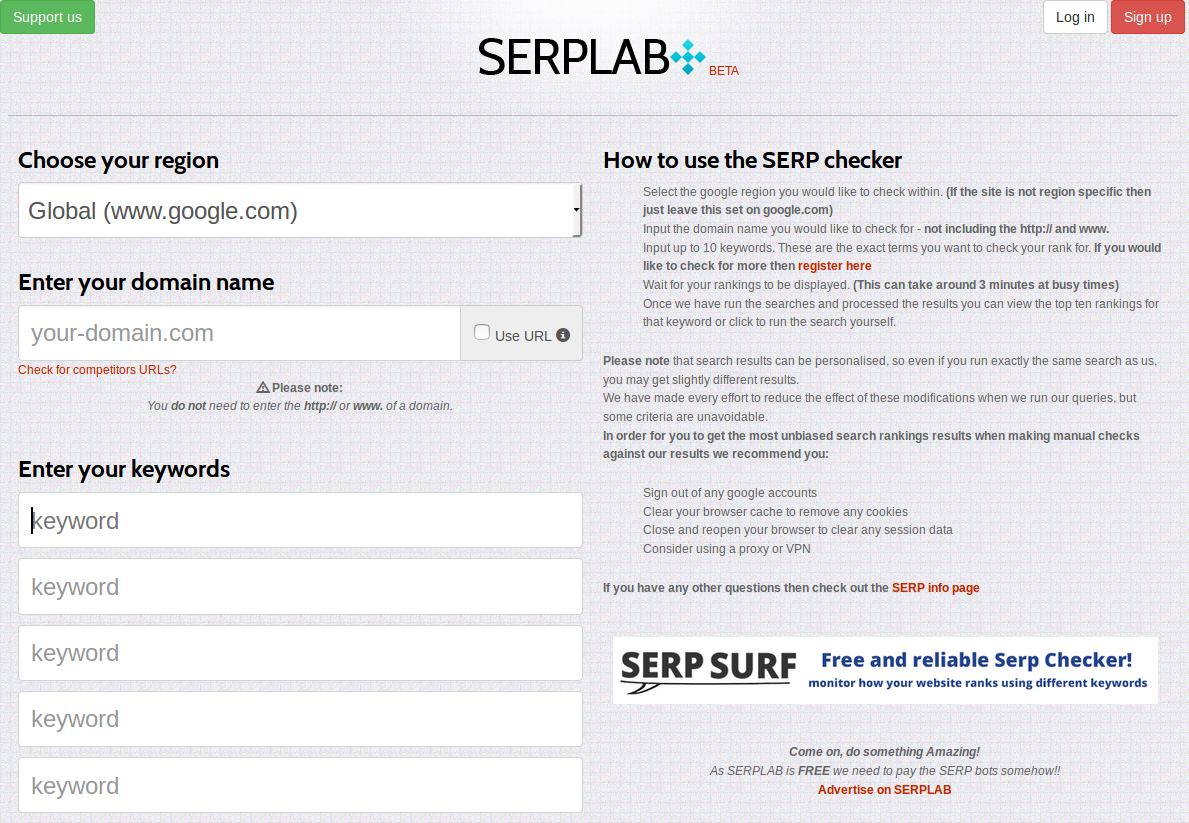
To conclude, we would like to leave you with two Google extensions: one is SEO SERP for Chrome and the other is Rank Checker for Firefox.
What to take into account from now on:
This has been a very quick and basic review of the off page optimization concepts you must know about, especially those related to SEO Page Rank. The tactics we’ve mentioned for improving it, are within your reach, and those that you can start taking advantage of right now.
So keep in mind: whatever you do to improve your reputation and authority will positively impact your PageRank and Domain Authority.
Remember that generating relevant, quality, content, that makes the person who has decided to quote your site and/or content look good, is the most powerful factor, as it will be the engine that causes the entire link structure to start working and growing.
